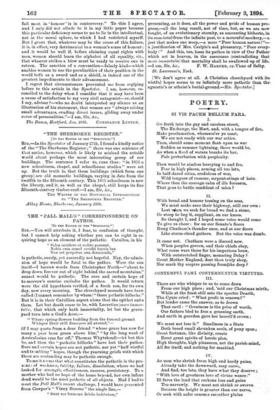`IRE "PALL MALL'S" CORRESPONDENCE ON PATHOS.
[To THE EDITOR OF THE "SPECTATOR."] SIE,—Yon will attribute it, I fear, to confusion of thought, but I cannot help asking whether you can be right in re- quiring hope as an element of the pathetic. Catullus, in his "Soles occidere et redire possunt,
Nobis cum semel occidit brevis lux Nox est perpetua una dormienda," is pathetic, surely, yet assuredly not hopeful. Nay, the admis- sion of hope would be fatal to the pathos. Were the sun itself—I borrow words from Christopher North—" about to drop down forever out of sight behind the sacred mountains,"
sunset would be pathetic. The sure and certain hope of to-morrow's sunrise excludes the pathos. It would return were the old hypothesis verified, of a fresh sun, for its own day, new every morning. The churchyard mounds have been called (I cannot remember by whom)" those pathetic hillocks." But it is in their Catallian aspect alone that the epithet suits them. Let but death cease to be, with Lucretius (inors immor- talis), that which only hath immortality, let but the grave- yard turn into a God's Acre,— " Where spring-flowers budding from the funeral ground Whisper their still Resurgam all around,"—
(if I may quote from a dear friend "whose grass has now for many a year been green above him," "by the long wash of Australasian seas far off," Thomas Whytehead)—let but this be, and then the "pathetic hillocks" have lost their pathos. Sure and certain hopes are not pathetic, nor yet "half wistful and trembling" hopes, though the yearning griefs with which these are contending may be pathetic enough.
To me it seems that what constitutes the pathetic is the pre- senc 3 of weakness, futility, failure, dissolution, where we bad looked for strength, effectiveness, success, persistency. To a mother who had no hope of the home beyond, her own infant dead would be the most pathetic of all objects. Had I had to meet the Pall Mall's recent challenge, I would have presented from Cowper's " Vinny Bourne" the single line,—
" Sant res humanx flebile ludibrium,"
presenting, as it does, all the power and pride of human pro- gress,—all the long result, not of time, but, as we are now taught, of an evolutionary eternity, as amounting hitherto, in its sum-total from the infinite past, to a mournful mockery,—a jest that makes one weep,—a mere "Poor human nature 1"— a justification of Mrs. Carlyle's sad pleasantry, "Poor every- body!" And this, too, loses its pathos in view of Our Father which art in heaven, in the assurance (contradicting that mars intmortalis) that mortality shall be swallowed up of life.
[We don't agree at all. A Christian churchyard with ite wistful hopes seems to us infinitely more pathetic than the agnostic's or atheist's burial-ground.—ED. Spectator.]


































 Previous page
Previous page